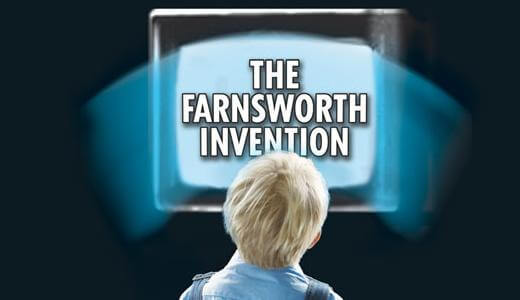The Fight for Farnsworth’s Invention

The story of the invention of television is apparently a murky one, with two men fighting for the patent. It is also a story of how an industry grew around patents, of the stock market crash, and the last lone inventor. A story loosely based on true events, “Farnsworth Invention” is playwright Aaron Sorkin’s what-if version of events and is currently playing at the Music Box Theater.
Philo T. Farnsworth (played by Jimmi Simpson) was a boy genius from a potato farm in Utah. David Sarnoff (played by Hank Azaria) was a Jewish kid whose family home was burned by the Russians before he and his family immigrated to the United States. The audience watched how they grew from their humble beginnings into two men who have so influenced our lives. Farnsworth threw himself into the invention he first masterminded at the age of 15, while Sarnoff worked to increase his influence and then his capital until he became the president of Radio Corporation of America, and more. They are the two narrators who enter and leave the action of the play, and join in a mighty battle, through a hail of words, which rages in front of the audience in a quick succession of scenes. They tell the story of their lives, and of television. They tell it as they know it, or as they have convinced themselves it has happened.
But how did TV come about? Who came up with that name? How does it work, exactly? All these questions have fascinating answers, which are to be found within the play. Comedic at times, tragic at others, (but never a court room drama) the dialogue and the action never let up.
Despite austere props, the 1920’s come to life on stage. Azaria and Simpson powerfully portray the main characters, while a handful of others take on the numerous supporting roles. But it isn’t the 1920’s of reality; it is the 1920’s that we have come to know through television. Other elements of the play, such as the quick changes of scene, and the “close ups” that narrators illuminate, also smack of a television production. This is television culture, and you—a seasoned addict—know all the ins and outs. The creator of this play knows them too making this one of the most watchable plays I have ever seen.
It is also a brooding and contemplative piece. Sarnoff and Farnsworth are allowed to speak on equal terms on stage, as they never could have in reality. What would they say to each other? Television isn’t simply a machine; it ended up being the start of a whole culture. As a medium for information, these early contributors had great hopes for it. Watching the first man land on the moon was a dream and a gold standard. It has come to be. But is that representative of what TV is used for now?
Go see the play: Music Box Theater. Don’t pay a whole lot for tickets: Theater Development Fund.
This is interesting stuff. Read more about it:
>>>Philo T. Farnsworth (played by Jimmi Simpson) was a boy genius from a potato farm in Utah. <<>>David Sarnoff (played by Hank Azaria) was a Jewish kid whose family home was burned by the Russians before he and his family immigrated to the United States.<<<
A complete fabrication by the playwright, conjured up to provide moral justification for Sarnoff’s conduct.
That such fabrications keep getting repeated by people who see the play as iteration of fact is what is wrong with this whole enterprise.
Even more so when it gets to the verdict in the patent litigation: the play portrays Farnsworth losing to Sarnoff; in reality, Farnsworth was the first independent inventor to defeat Sarnoff and RCA. Apparently that pivotal detail did not fit the playwright’s preconceived notion of how the story should play out. So he just changed it. Hey, it’s only history.
As long as you’re providing links, please put in one to
http://thefarrnsworthinvention.com
Thanks,
–PS
>>>A story based on true events, “Farnsworth Invention” is playwright Aaron Sorkin’s what-if version of events and is currently playing at the Music Box Theater<<< I was hoping that phrase was enough of a caveat, as well as the fact that the review concerns a play, not actual history. I will add the word ‘loosely” in that first sentence, as you are correct: Farnsworth did win the suit, to start with. Thank you for the read, and for your comment. Obviously, the controversy lives on and this play has brought it to the public’s attention despite inaccuracies and biases it may be propagating.